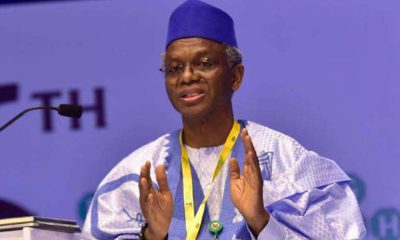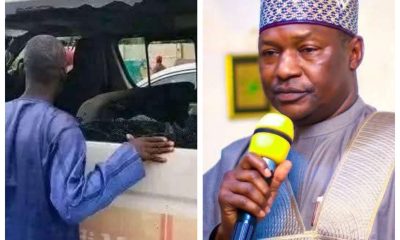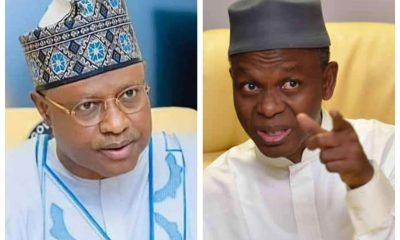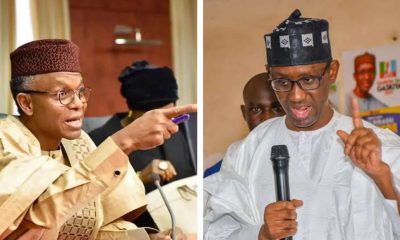Nation
Gov. El-Rufai, apostle of interest, leads revolt against President Buhari

Adebayo Obajemu
Kaduna State governor, Nasir El-Rufai is no stranger to controversy. His latest offering in that respect has been coming in the past two weeks when he has consistently but indirectly accused President Buhari, his foster political father, of planning to scuttle democracy and install an interim government; allegedly, according to him, to be headed by a retired army general. His current position against the naira swap policy of government has brought out the “animal in him”, as late Afro-beat king, Fela Kuti, would put it.
He has challenged the authority of the Federal Government and the battle line is drawn. By defying the order if the President, he is treading on the borders of treasonable felony, and may have himself to blame. Informed sources said, he is behaving like a hunter’s dog destined to die that would not hear the whistle of the hunter. In other words, he is biting the finger that had fed him, and, for such people, the end is usually catastrophic. His sudden change of loyalty, though characteristic, is really instructive as well as bewildering.
It is unthinkable that El Rufai, of all people, would be openly engaged in a fight with President Buhari, who literally picked him to become governor. He was one of the closest governors to Buhari, and defended him like a zealot. But how time has changed; today, Buhari is the past and El Rufai has jumped ship sailing to the future. However, like the proverbial saying, he the gods want to kill, they first make mad; El Rufai may reached the end of the road in Nigerian politics, because unless his party wins, he is not likely to be a free man.
He did it against Atiku Abubakar and former president Obasanjo. So, Buhari can find solace in the. El Rufai was practicing as a surveyor in Kaduna Abuja, when Atiku discovered him for some consultancy he did for TCPC, the forerunner of Bureau for Public Enterprises, BPE, and brought him to Obasanjo, who appointed him the Director General, and later minister of FCT. When Atiku fell out with Obasanjo, El Rufai was his worst critic and traducer.
Then, after a short self imposed exile, he switched allegiance and joined the Buhari train, which eventually brought them to power in 2015. Before then, he became Obasanjo’s nemesis and spared no invectives for the old man, and quickly reconciled with Atiku. Again, when Atiku left APC to rejoin PDP, he became enemy number One to him. Now, Buhari has joined the list of people he has used and dumped.
The handwriting had long been on the wall. Sources said El Rufai was the driver of the Tinubu project, who brought the other North West governors to overrule the president after Buhari had begged them to allow him choose his successor. Having rebuffed the president’s plea and imposed him as the candidate of the party, El Rufai has been his strongest promoter and the most visible face of his campaign.
Following the cash swap policy, the gadly first stirred the hornet nest when in a Channels television interview, he said some powerful elements in Aso Rock, close to Buhari are working at cross purposes to the presidential candidate of the All Progressives Congress, Asiwaju Bola Ahmed Tinubu.
According to the Kaduna State governor, these Aso Rock cabal have decided to work against Tinubu because their plan to have Senate President Lawan or Central Bank governor Godwin Emefiele to succeed Buhari failed as Tinubu won the presidential primary of the APC
He was emphatic that he knows those in Aso Rock, around President Muhammadu Buhari, who are not only working against the ruling APC but are conspiring to derail the forthcoming general elections and enthrone an interim government.
“It turned out that some of the wildest stories of conspiracy to derail the transition at best for APC to lose, preferably for the whole system to result in no election leading to an interim arrangement began to rear their heads.
“I have no problem naming them. I’m not afraid of anybody. But for me, naming them is giving them traction. They are nothing. They are not capable of winning elections. They have no idea of electoral or political legitimacy. They can only hide behind the likes of President Buhari to achieve their objectives.”
El-Rufai has always been a controversial figure with a history of opportunistic posturing. When he was the Minister of the Federal Capital Territory, he courted controversy through a series of demolition that hurt the high and mighty in Abuja, in a bid to restore Abuja master plan.
He has never been afraid to say his mind, no matter whose ox is gored.
In the early days of the Buhari administration, he was ranked among the closest to the president and was fingered as being among the inner circle of the emerging cabal around the president.
As governor, he has equally been controversial, especially in the ethnically and religiously sensitive Kaduna State. He took measures that were considered controversial and bold in the early years of his administration as governor.
On 6 August 2015, El-Rufai, in one of his first acts as governor, announced that Kaduna State will adopt the Treasury Single Account policy by September 1, of the same year. At the end of the exercise, 470 accounts belonging to different ministries, departments and agencies were closed and a sum of N24.7 billion was recovered and remitted to the Kaduna State Government TSA with the Central Bank of Nigeria.
By blocking leakages and cutting the cost of running government, it is estimated that the El-Rufai administration was able to save N1.2 billion in just two months. El-Rufai also reformed the civil service in Kaduna State and reduced the number of ministries from 19 to 13 and the number of permanent secretaries from 35 to 18.
In a bid to reduce the cost of governance, El-Rufai appointed only 13 commissioners, 10 special advisers and 12 special assistants as against the 24 commissioners, 41 special advisers and about 400 special assistants appointed by the previous administration.
As governor, El-Rufai had embarked on a comprehensive education reform with the goal of revamping the moribund state of education. El-Rufai sacked over 22,000 unqualified primary teachers.
El-Rufai’s administration launched the School Feeding Programme, aimed at providing one free meal per day to 1.5 million pupils in public primary schools within the state. He also abolished the collection of fees and levies in public primary and junior secondary schools in Kaduna, thereby removing a financial burden of N3 billion from the parents.
On 20 August 2020, controversy arose on social media when the Nigerian Bar Association invited Governor El-rufai to speak at its annual conference. Thousands of Nigerians signed a petition on change.org to have Governor El-rufai’s invitation revoked. The NBA succumbed to the pressure and de-invited the governor.
A report by Open Bar initiative cited eight reasons why El-rufai’s invitation to the general conference was turned down. Some of the reasons include his refusal to obey court orders in his case with Audu Maikori, threatening Gloria Ballason, who was Maikori’s lawyer and a report by Quartz (publication) Africa, which named Governor El-rufai as the head of a “powerful” group of Nigerian governors who “now regularly use security agents to arrest and intimidate journalists, who dare to question their actions or attempt to hold them accountable”.
He is largely seen as a violator of human rights. In December 2021, a human rights watchdog group published a report alleging that El-Rufai has punished protestors in Kaduna State.The report details two incidents in which El-Rufai responded to protests by putting the protesting community under house arrest. The first of these lockdown orders was in December 2016 in Jema’a Local Government area and the second stretched 72 days starting in June 2020.
The report also states that El-Rufai has punished protestors with these lockdown orders at least six times since the first incident in 2016 and goes on to document El-Rufai’s large wealth as evidenced by his and his family’s wide international travels, extravagant lifestyle, and the fact that he sends one of his sons to a private boarding school in Canada, where tuition runs about $44,000 USD per year. The report concludes by calling for international governments to sanction El-Rufai for his actions.
According to one human rights watchdog group, “El-Rufai is pitching this as a measure to reduce religiously fueled violence, [but] he himself has a troubling history of fueling religious tension.” The watchdog group then cites how El-Rufai claimed, in a tweet posted on September 8, 2014, that Christians were behind Boko Haram, funding and controlling it to tarnish the name of Islam.
Boko Haram is not funded by Christians but is an Islamist terror group with strong ties to Islamic State.
In 2012, El-Rufai threatened anyone who might challenge the Fulani, an ethnic group, even in the line of military duty. “We will write this for all to read. Anyone, soldier or not that kills the Fulani takes a loan payable one day no matter how long it takes,” he tweeted.
In 2019, El-Rufai said, in reference to a conspiracy theory that election observers were meddling in the Nigerian election, that “the person who will come and intervene…will go back in body bags because nobody will come to Nigeria and tell us how to run our country.”
The greatest controversy around him was when he said those bandits and killer Fulani are foreigners, and that he had paid them not to kill the citizens of Kaduna. The social media was awash with anger on how a responsible administration could claim to pay off killers of his own people without taking action against them.
“He has been unstable in his ideological leaning, and more often he remains an opportunist”, says Professor Adeagbo Moritiwon, a political scientist in his chat with Business Hallmark.
Moritiwon said El Rufai once again is trying to reposition himself as champion of democracy and the people, “he wants to be on the winning side and once again hops into the new administration as important figure.”
Whatever may be said of him, one thing that can not be denied is that he remains an independent-minded figure, with a bold voice and for many he remains a smart intelligent figure.
He attended the prestigious Barewa College and Ahmadu Bello University where he read Quantity Survey.
Nasir Ahmad El-Rufai was born on 16 February 1960 to a Fulani family in Daudawa. His father died while he was 8 years old, and he was sponsored through his early schooling by an uncle in Kaduna. He turned 63 on Thursday.












